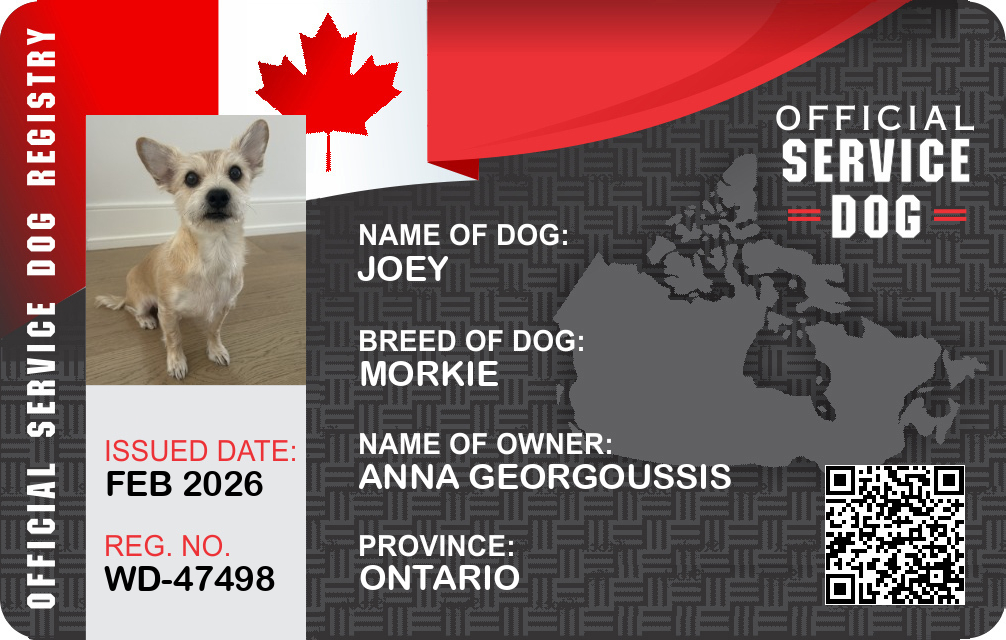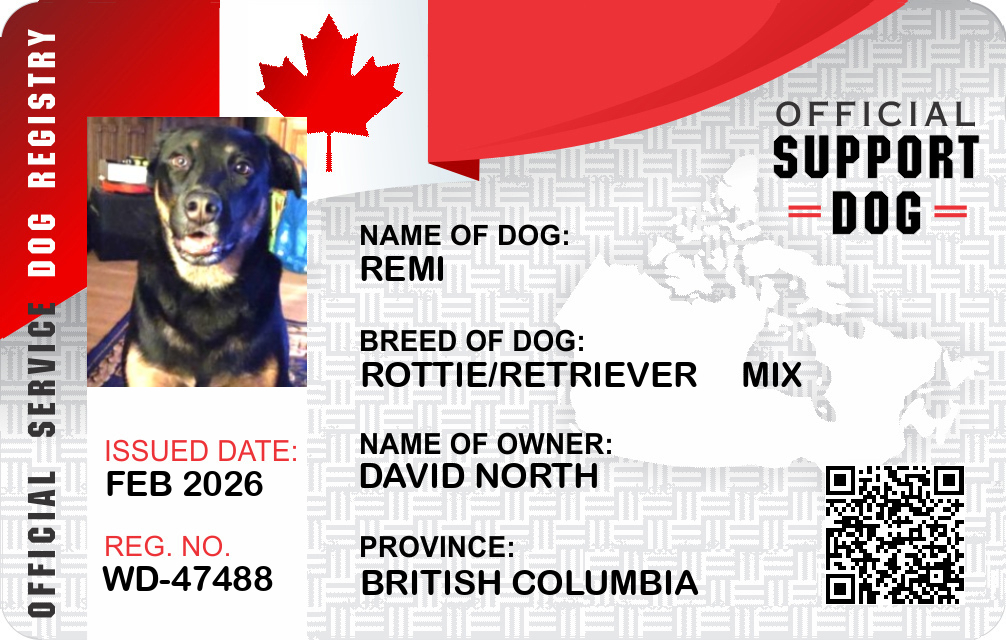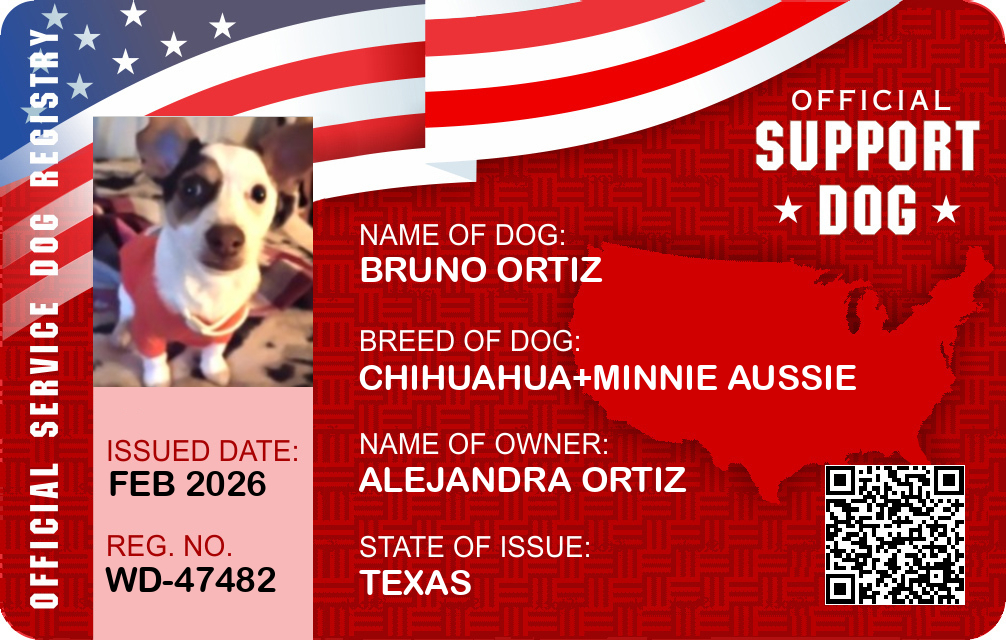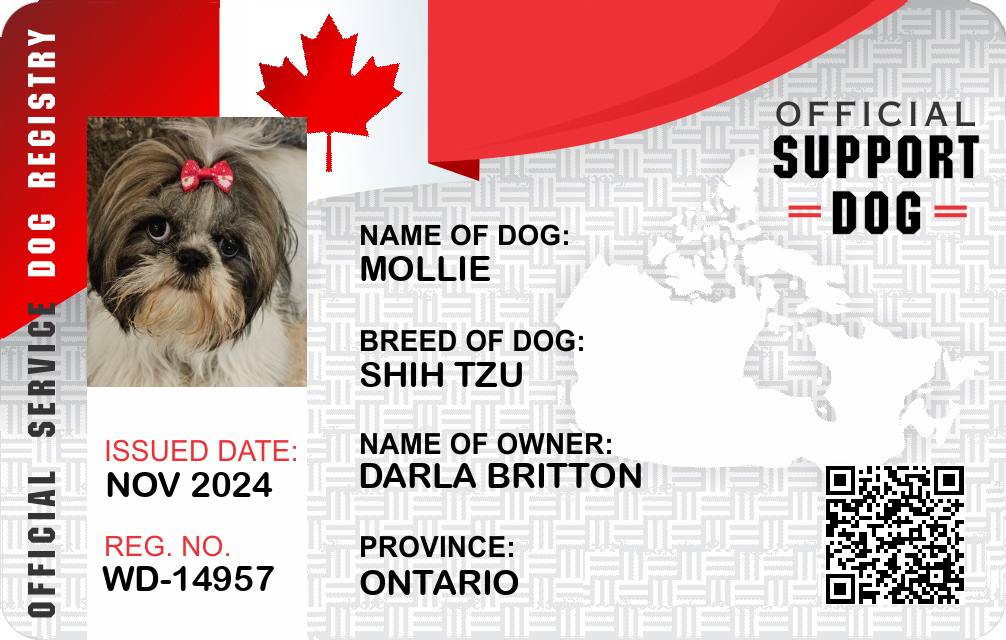New York Service Dog Laws
Get Your Documents
Example State Cards

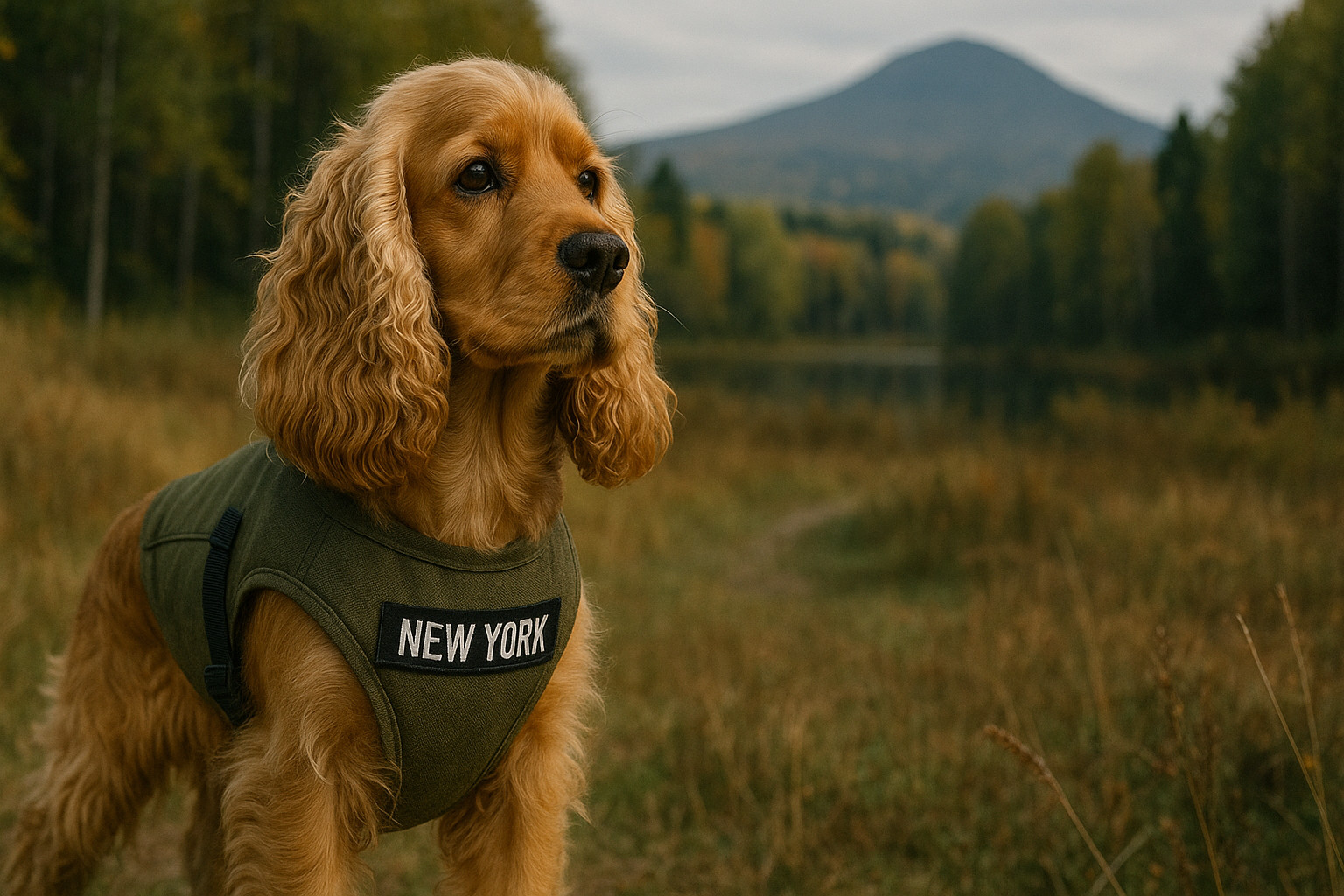
Service dogs are invaluable to individuals with disabilities, providing critical assistance and companionship. In New York, as with the rest of the United States, certain laws govern the treatment and acceptance of service dogs. This article provides a comprehensive guide to New York service dog laws. It focuses on definitions, federal and state legal requirements, rights, and responsibilities of handlers. Additionally, it offers practical guidance for compliance.
Overview of Service Dog and Legal Definitions in New York
What is a Service Dog?
A service dog is defined as a dog that is individually trained to perform tasks or do work for the benefit of an individual with a disability. Disabilities may include but are not limited to, physical, sensory, psychiatric, intellectual, or other mental disabilities. These tasks are directly related to the person’s disability. They can include guiding individuals who are blind, alerting people who are deaf, pulling a wheelchair, alerting and protecting a person having a seizure, or reminding a person with mental illness to take prescribed medications.
How Service Dogs Differ from Other Types of Assistance Animals
Service dogs are distinct from other types of assistance animals such as emotional support animals (ESA), therapy animals, and comfort animals. While ESA provide comfort with their presence, they do not have special training to perform tasks related to a disability. This distinction is crucial as service dogs are granted broader access rights under the law that other assistance animals are not.
Key Federal Laws Affecting Service Dogs (e.g., ADA, FHA, ACAA)
- Americans with Disabilities Act (ADA): It prohibits discrimination against individuals with disabilities in all areas of public life. The ADA mandates that state and local governments, businesses, and nonprofit organizations that serve the public must allow service dogs to accompany people with disabilities. They must be allowed in all areas where the public is normally allowed to go.
- Fair Housing Act (FHA): This law requires housing providers to make reasonable accommodations for individuals with disabilities, including allowing service dogs and ESA, despite any “no pets” policies.
- Air Carrier Access Act (ACAA): This act enforces regulations that prevent discrimination in air travel. Under the ACAA, airlines must permit service dogs to accompany their handlers in the cabin of the aircraft at no extra charge.
State-Specific Service Dog Laws in New York
Housing Rights and Responsibilities
In New York, landlords must accommodate the needs of individuals with service dogs or ESA under the FHA. This means waiving “no pet” policies and exempting service dogs from pet fees or deposits. Landlords can request documentation of the disability and the necessity of the animal. However, it must be reasonable and not unduly burdensome.
Public Access and Accommodation
Under New York law, service dogs must be allowed in all public areas where their handlers go. This includes restaurants, hotels, retail stores, theaters, and hospitals. Businesses may only ask two questions: if the dog is required because of a disability and what task the dog is trained to perform. They cannot request documentation, demand the dog demonstrate its task, or inquire about the handler’s disability.
Transportation and Travel Rules
Service dogs are welcome on all forms of public transportation within New York, including buses, subways, and trains. They must be leashed and under control, and no additional fees can be charged for the service dog’s presence. For air travel, handlers should notify airlines in advance to ensure compliance with ACAA regulations.
Employment and Workplace Considerations
Under the ADA, employers must provide reasonable accommodations, which include allowing service dogs in the workplace. An employer may ask for documentation of the disability-related need for the dog for a reasonable accommodation. However, they cannot require proof of the dog’s training or certification.
Documentation, Requirements, and Processes in New York
Service Dog Documentation and Who Can Issue It
While the ADA does not require service dogs to be certified or registered, New York does recognize certifications issued by training programs as one way to verify a service dog’s status. Documentation should outline the handler’s disability and how the service dog assists with it. Medical professionals, such as therapists or doctors, can issue letters verifying the need for a service dog.
Landlord, Business, and Provider Verification Rules
When dealing with landlords, businesses, or service providers, handlers may be asked to provide some form of verification regarding their service dog. However, such parties cannot demand proof of training, certification, or request a demonstration of the dog’s tasks. Businesses can only seek the general description of tasks to maintain compliance with the ADA.
Rights, Limitations, and Legal Risks
Rights Service Dog Handlers Have in New York
Service dog handlers are allowed to be accompanied by their service dogs in any place where the public is allowed. This includes housing (with reasonable accommodations), public transport, and places of employment. They are also protected from any form of discrimination based on their disability.
Limits on Service Dog Protections and Common Restrictions
There are limitations to where service dogs can go, particularly in places that maintain strict health regulations, such as food preparation areas. If a service dog is not under control and behaves aggressively or disruptively, handlers can be asked to remove the dog. However, the handler must still be offered the opportunity to receive services without the dog.
Penalties for Fraud or Misrepresentation
Misrepresentation of a pet as a service dog is illegal in New York. Such actions can lead to fines and community service. This enforcement helps maintain genuine access for individuals with legitimate needs for service dogs. It also prevents abuse of the accommodations granted by law.
Practical Guidance for Service Dog Handlers in New York
How to Qualify for a Service Dog Legitimately
To qualify for a service dog, an individual must have a disability as defined by the ADA. They must have a need for the dog to perform specific tasks related to that disability. Working with a certified service dog training organization is advised to ensure the dog is properly trained and reliable.
How to Talk to Landlords, Airlines, and Employers
It is beneficial to be upfront and clear with landlords, employers, and airlines about the need for a service dog. Handlers should be prepared to provide reasonable documentation regarding their disability. They must also explain the tasks the service dog is trained to perform. Training on how to effectively communicate about their service dog can be an asset for handlers.
Summary of Service Dog Laws in New York
– Service dogs are specially trained for tasks related to disabilities and are protected under local and federal laws. – Federal laws like the ADA, FHA, and ACAA provide a framework that state laws like those in New York complement. – Service dog handlers in New York have specific rights concerning housing, public access, transportation, and employment. – Handlers must understand the limitations and rules surrounding service dogs to avoid conflicts. – Documentation should focus on the handler’s disability need for the service dog, not the dog’s certification. – Fraudulent representation of pets as service dogs is illegal and punishable by law. – Handlers should ensure their service dogs are appropriately trained and maintain control to afford them the broadest access possible.
Comprehending New York’s service dog laws enables handlers to exercise their rights effectively while ensuring their responsibilities are met. While navigating the intricacies of these laws can be complex, staying informed and prepared is key. This helps in maintaining legal compliance and fostering good relations between handlers and the community.
Get Your Documents
Example State Cards





